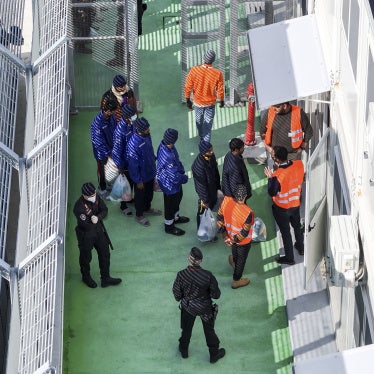Critical aspects of Dutch asylum policy violate international refugee standards, Human Rights Watch said in a new report released today.
Human Rights Watch urged the new Dutch government being formed to prioritize reforms to bring asylum policy back in line with international standards.
The 33-page report, "Fleeting Refuge: The Triumph of Efficiency Over Protection in Dutch Asylum Policy," raises concern about recent policies adopted to hasten the processing of asylum claims at the expense of the protection needs of refugees.
"In its efforts to control immigration, the Dutch government cannot violate fundamental rights," said Elizabeth Andersen, Executive Director of Human Rights Watch's Europe and Central Asia Division. "The new government in formation should prioritize asylum reform and return the Netherlands to its traditional role as a leader in the defense of human rights and refugee protection in Europe."
The Human Rights Watch report is based on three months of research involving review of dozens of transcripts and decisions in asylum cases and extensive interviews with asylum lawyers, humanitarian and human rights organizations, and representatives of the Dutch immigration agency. The report highlights Human Rights Watch concerns in three areas: violations of the right to seek asylum in a routinely-used accelerated determination procedure; the improper treatment of migrant children; and restrictions on asylum seekers' rights to basic material support, including food and adequate housing.
Human Rights Watch reports that the Dutch accelerated "AC Procedure" is being used to process cases for which it is inappropriate. The 48-hour procedure was originally designed to screen out clearly unfounded cases, but is now used to process 60 percent of asylum claims, with government officials aiming to process 80 percent through this accelerated review.
Human Rights Watch said the process gives applicants little opportunity to document their need for protection, receive meaningful advice from a lawyer, or effectively challenge a negative decision on appeal. Particularly for cases involving humanitarian concerns or complex legal or factual questions, Human Rights Watch said the AC procedures are inadequate.
"The accelerated determination procedures are regularly used to assess the claims of people suffering trauma or fleeing countries torn by war or repression," said Andersen. "Under these circumstances, the authorities run a very real risk of sending people back to face persecution."
The Human Rights Watch report also charges that certain aspects of Dutch immigration policy fail to serve the best interests of migrant children as required under the Convention on the Rights of the Child. Specifically, Human Rights Watch expressed concern that more than 30 percent of child asylum seekers have their claims reviewed in the cursory AC procedure.
Human Rights Watch found that interviews of children are often conducted in a manner inappropriate for their age and maturity and without the benefit of consistent assistance from a lawyer or guardian. Human Rights Watch also concluded that Dutch government determinations that a child is "accompanied" by a relative in the Netherlands do not sufficiently assess whether those relatives are willing or able to provide children with long-term care.
In a third area of concern, Human Rights Watch criticized Dutch policy to deny basic material support, including food and housing, to asylum seekers still in various stages of the asylum process. Human Rights Watch says this policy leaves asylum seekers, including families with children, homeless and dependent on charity for basic survival while awaiting a final determination on appeal from the AC procedure. In one case reported by Human Rights Watch, a family from Rwanda was evicted from the asylum reception center after the immigration authorities rejected their asylum claim. When a court later overturned that decision, the family could not be found.
"People seeking asylum cannot do so effectively if they are worried about where they and their families will sleep," said Andersen. "Policies that deny basic assistance to those in need are inconsistent with the Netherlands' humanitarian tradition."
The report includes detailed recommendations intended to assist any new government in the effort to ensure that asylum and immigration policies comply with the Netherlands' international and regional legal obligations. To read these recommendations to the Dutch government, please click here.







